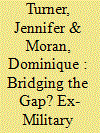| Srl | Item |
| 1 |
ID:
188791


|
|
|
|
|
| Summary/Abstract |
Prior research into military–civilian transition has suggested that the Prison Service may be a popular destination for Armed Forces leavers, but the experience of former military personnel within the prison system as prison staff (rather than as Veterans in Custody) has so far been overlooked. As a result, we know very little about their route into prison work. This article reports on a UK study investigating the experience of prison personnel who have previously served in the military and presents the first set of empirical evidence addressing these critical questions. Whilst our findings mirror prevailing assumptions of a relatively seamless transition to post-military careers (and, in particular, those within Protective Service Occupations), few had intended a career in prison work specifically. Such trajectories may influence personal military–civilian transitions, as well as job performance in prison work and, by extension, the everyday lives of prisoners and other prison staff.
|
|
|
|
|
|
|
|
|
|
|
|
|
|
|
|
| 2 |
ID:
152357


|
|
|
|
|
| Summary/Abstract |
Connecting the stories of human rights violations perpetrated by the Syrian regime against the children of Darʿa in March 2011 to decades of writings about political detention in Syria, this article argues that particular works of Syrian prison literature (adab al-sujūn) articulate a poetics of recognition that both reaffirms and challenges the foundational dependency on political recognition in human rights theory. By focusing on narrative scenes of recognition and misrecognition, I contend that these texts, much like the stories of the children of Darʿa, depict different forms of acute human vulnerability. In doing so, they offer a mode of sentimental education that evokes readers’ empathy and awareness of human suffering. Yet such texts also demonstrate, in allegorical form, how the foundational reliance on political recognition in human rights regimes can limit their efficacy.
|
|
|
|
|
|
|
|
|
|
|
|
|
|
|
|